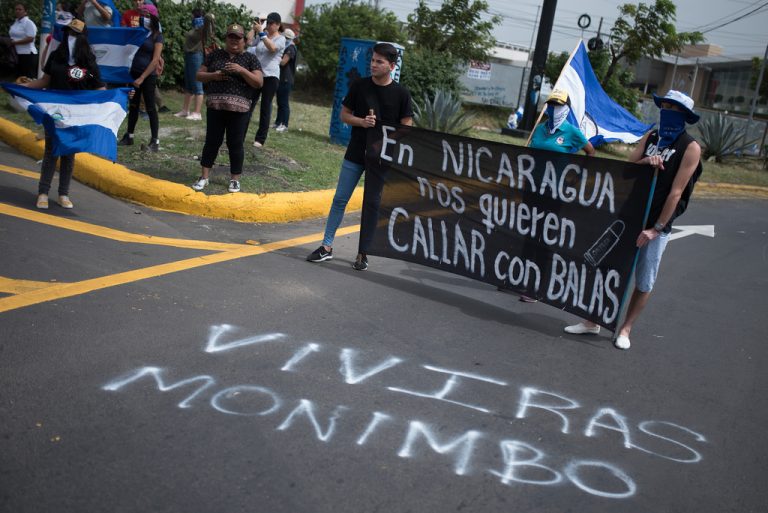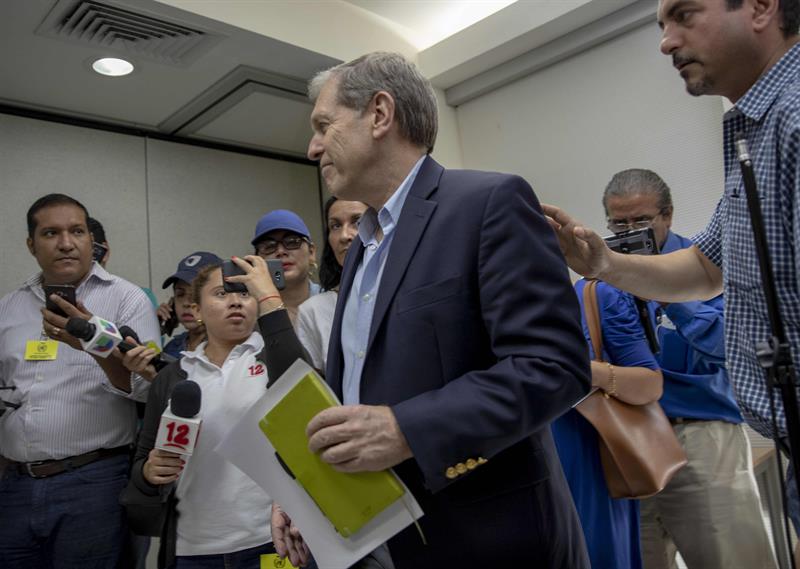1 de septiembre 2018

Children of Exile: The Births “Sowing Hope” in the Camp of Nicaraguan Farmers

PUBLICIDAD 1M
PUBLICIDAD 4D
PUBLICIDAD 5D
Ortega rejects the report and accuses the office of the High Commissioner of being “an instrument of the powerful who impose their policies of death.”

Carlos Herrera | Confidencial
The final report to date of the Office of the UN High Commissioner for Human Rights (OHCHR) will be brought before the UN Security Council on September 5th. The report details the use of “lethal force” on the part of Daniel Ortega’s government and the paramilitary groups, directed against the “non-lethal threats” of the Nicaraguans who rose in protest.
The report will be presented to the Security Council despite the fact that Ortega has disavowed it, accusing the UN office of being “an instrument of the powerful who impose their policy of death.”
The report concludes that the government actions during the four months of protests “were in violation of international law of human rights,” and enumerates specific violations such as the disproportionate use of force on the part of the National Police, that in some cases translated into extrajudicial executions, forced disappearances, blocking access to medical attention, arbitrary or illegal detentions, mistreatment, cases of torture and sexual violence, as well as the criminalization of social leaders, human rights advocates, journalists, and demonstrators critical of the government.

The coordinator of the mission in Nicaragua for Central America of OHCHR, Guillermo Fernández Maldonado. Photo: EFE | Confidencial
Guillermo Fernandez Maldonado, coordinator of the ACNUDH’s mission in Nicaragua for Central America, stated that the report – entitled “Human Rights Violations and Abuses in the Context of Protests in Nicaragua” – was not intended to polarize the situation, but to provide information at a national and international level, so that they could best contribute to a way out of the current crisis.
“A meeting is planned on September 5, in which the case of Nicaragua will be examined. This is already scheduled and must be approved by the vote of nine members of the Security Council. This will raise the issue before the highest body in the United Nations, where aspects of security of greatest concern to the world are considered. Logically, this report is going to be an input read by the members of the Security Council to evaluate the situation,” Fernandez Maldonado explained.
Zeid Ra’ad Al Hussein, the UN High Commissioner for Human Rights, warned that Nicaragua could face a future similar to that of Venezuela, with a weakened economy, if it doesn’t stop the repression against its citizens and free the demonstrators who have been detained.
“Those who never should have been detained for exercising their right to gather peacefully should be freed,” added the UN High Commissioner, who in two more days will turn his witness over to his successor, former Chilean president Michelle Bachelet.
It’s possible that some country will request an urgent debate on the situation in Nicaragua, and, according to Fernandez Maldonado, it’s possible that the Human Rights Council could adopt a similar resolution on the situation in Nicaragua. “The report can serve as a tool for orienting possible discussions in two of the most important organs of the United Nations,” he stated.
The report highlights the fact that there are clear indications that armed pro-government elements, including the “shock forces”, acted with the consent of high-ranking state and National Police authorities, many times in a joint and coordinated manner.
“These groups participated in raids and attacks against protesters and carried out illegal detentions. Although the Government no longer denies the existence of pro-government armed civilians, it condones their actions and allows them to operate with impunity,” states the document, which was read in Nicaragua by Fernandez Maldonado.
Zeid, who is known for his clear positions in defense of human rights beyond political pressures, stated that – as occurred at the beginning of the Venezuelan crisis – in Nicaragua the leaders of the protests are being accused of terrorism, when in reality “they’re fighting for the most basic rights.”
The report denounced the “very intense level of repression,” exercised by the government forces and irregular armed groups that support them, especially against the students, many of whom are currently in jail.
“The human rights crisis in Nicaragua is ongoing, and authorities continue to resort to smear campaigns, threats of prosecution, arbitrary dismissals of civil servants and other forms of harassment or intimidation against individuals perceived as critical of the Government. Leaders of rural movements (Movimiento Campesino) and of student movements have been particularly targeted. This pattern has created a climate of fear and mistrust among the population,” Fernandez Maldonado notes in the document.
The report read by Fernandez Maldonado speaks of a high level of persecution on the part of the government, so that many citizens who have participated in the protests have been forced to go into hiding or leave the country. According to ACNUR, the UN Refugee Agency, 23,000 requests for asylum were received between April and July 2018, on the part of Nicaraguans seeking refuge in Costa Rica.
Regarding the legal persecution of citizens accused of organized crime, murder or terrorism, the report states that the trials are seriously flawed and are not held in accordance with the guarantees of due process, including the principle of impartiality on the part of the judges and tribunals.
It also criticizes the government posture of President Daniel Ortega: “Rather than recognizing responsibility for any wrongdoing during the crisis, the Government has placed the blame on community and opposition leaders, human rights defenders and media outlets” and has called the peaceful demonstrations ‘coup related violence’.”
“Moreover, the Government has attributed the responsibility for all violent actions to those who participated in the protests, including concerning the 197 deaths it had recognized as of 25 July. It has not acknowledged any disproportionate use of force or illegal action by police agents,” reads the document.
The report continues: “The State’s lack of will to carry out prompt, impartial, thorough and independent investigations on alleged human rights violations and abuses seriously jeopardizes victims’ rights to justice, truth and an effective remedy.” Moreover, “The lack of independence of the judiciary and reported irregularities of the Office of the Attorney General and the Legal Medical Institute pose serious concerns in terms of accountability.”
The OHCHR team in Nicaragua criticized the fact that it has faced obstacles in carrying out their monitoring work. Nonetheless, Maldonado affirmed that they would continue to request “full and unfettered access to the whole country, including to places of detention and stands ready to engage in dialogue with the Government, including on technical cooperation.”
On Wednesday afternoon, August 29, Ortega officially rejected the report presented by OHCHR calling it an “instrument of the powerful who impose their policies of death.” Ortega, visibly angry, emphasized that the half-million signatures he had gathered on the part of the “people demanding justice” would be delivered to “the blind men of the United Nations human rights organizations.”
“To them, these “victims” don’t exist. If the person tortured was a Sandinista, he doesn’t exist. A commission managed by we know who, by the powerful, by those who have taken ownership of entire continents, by those who have committed genocide against entire peoples, those are the owners of this United Nations’ human rights commission who came to Nicaragua because we invited them, but in their reports, these murdered, these tortured don’t exist,” expounded an irate Ortega.
The Sandinista leader stated that to the OHCHR the “coup terrorists” are little angels who don’t torture anybody, and that the world doesn’t believe them since they’ve become instruments of the powerful.
“To those who impose their politics of death on the peoples, they’re the same ones who reduced the peoples of entire continents to slaves…who took them from Africa to work. They’re the same, the same colonialists who have invaded and continue to invade and to destroy entire peoples, these organizations, in this case the United Nations, is nothing more than a policy instrument of death, terror, lies, infamy. They’re despicable and it’s a good thing that we Nicaraguans are getting to know them better,” he repeated in anger.
Based on the findings contained in the report, The United Nations High Commissioner for Human Rights made the following recommendations to the government of Nicaragua:
According to the UN both heavily armed police and paramilitary forces have been used to kill, capture and intimidate unarmed demonstrators.
1- “Put an immediate end to harassment, intimidation, stigmatization, criminalization (including through the use of counter terrorism legislation) and other types of reprisals in relation to participation in the protests, including against demonstrators, human rights defenders, political opponents, journalists and others.
2- Immediately dismantle and disarm pro-Government armed elements and protect the population from attacks and other illegal and violent actions from such groups.
3- Also, ensure that independent, impartial, effective, thorough and transparent investigations be promptly conducted into all allegations of serious human rights violations and abuses…especially extrajudicial killings, torture, enforced disappearances and arbitrary or unlawful arrests and detentions.
4- Halt all unlawful arrests and release all persons who have been arbitrarily detained; ensure that the due process rights of all persons being prosecuted are respected and that any criminal charges brought against them are in line with the principles of legality, proportionality and individual liability.”
There were a number of other recommendations, including that the Ortega government assure full respect for the right to peaceful assembly through the proper management of public gatherings, according to the applicable international standards and norms of human rights.
Some other important recommendations were: “Take urgent measures to guarantee the independence and impartiality of the judiciary, refraining from any undue interference, pressure or influence”; and “Resume the National Dialogue in a meaningful and inclusive way to reach agreements based on human rights and democratic principles.”
—–
The complete report in English can be read at: https://www.ohchr.org/Documents/Countries/NI/HumanRightsViolationsNicaraguaApr_Aug2018_EN.pdf
PUBLICIDAD 3M
Periodista. Investiga temas de medio ambiente, corrupción y derechos humanos. Premio a la Excelencia Periodística Pedro Joaquín Chamorro, Premio de Innovación Periodística Connectas, y finalista del premio IPYS en el 2018.
PUBLICIDAD 3D